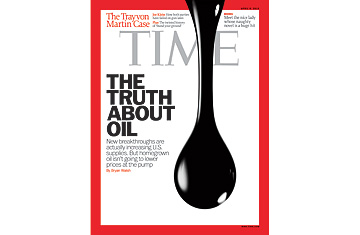
(6 of 6)
If tight-oil production spreads to more densely populated states like Ohio and California, both of which have shale plays, we could see those states gripped by the same controversies that have come with shale gas in Pennsylvania and New York. Sparse North Dakota is struggling to deal with the sudden influx of workers and equipment as well as the air pollution that results from tight-oil production. Even the oil industry is realizing that it needs to assuage public concerns. "We cannot ignore parts of the public that don't trust our industry and our ability to operate safely," Statoil CEO Helge Lund said at a recent energy conference. "This is a fundamental issue affecting us all."
The offshore drilling in Brazil's presalt reservoirs and in the Arctic waters being opened up by climate change is cleaner, but as seen with the Deepwater Horizon spill, if something goes wrong, it means catastrophe. If you think cleaning up an oil spill in the Gulf of Mexico was tough, try doing it in the remote, forbidding Arctic. But even greater than the immediate environmental danger posed by unconventional oil is the larger risk to the climate. One of the expected consolations of peak oil was the assumption that running out of conventional crude would finally force us to develop carbon-free alternatives such as wind and solar. Extreme oil means there will still be enough--more than 1 trillion barrels by one estimate--to keep cooking the planet if we decide to burn it all. Deborah Gordon, an expert at the Carnegie Endowment for International Peace, says that "21st century oil is not 20th century oil. New, unconventional oils are going to recarbonize global petroleum supplies."
So this is the future of oil: as costly as it is polluting. But if we can't ensure cheap oil, we can become more resilient when fuel becomes expensive. That requires continued improvements in energy efficiency. The U.S. has made some strides recently in that area (new vehicles get better mileage now than ever before), but it still lags the rest of the world. Obama's push to increase corporate average fuel-efficiency standards for vehicles to 55 m.p.g. by 2025 is vital. After all, doubling the mileage of your car is the equivalent of cutting the price of gasoline in half. Other kinds of energy alternatives must be developed to break the monopoly of crude, for environmental and economic reasons. Diversifying your energy supply is as wise as diversifying your portfolio. "We've got to develop every source of American energy, not just oil and gas but wind power and solar power, nuclear power and biofuels," Obama said in a recent speech. "That's the only solution to this challenge."
From Brazil to Bismarck, human ingenuity (and tens of billions of dollars in investment) has extended the age of oil, as well as our anxiety about it. There's no reason the same formula can't eventually bring it to an end--on our terms.
